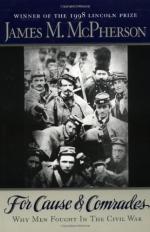
|
| Name: _________________________ | Period: ___________________ |
This quiz consists of 5 multiple choice and 5 short answer questions through Chapter 10, We Know That We are Supported at Home.
Multiple Choice Questions
1. From which state was the private who wrote in January 1862, after speaking to a slave whose husband had been beaten, that he was convinced of the "cruelty and inhumanity of the system"?
(a) Kentucky.
(b) Pennsylvania.
(c) Louisiana.
(d) New York.
2. When McPherson and his cousin visit the four Civil War battlefields near Fredericksburg, Virginia, he notes that it is the day after which of the following holidays?
(a) Labor Day.
(b) Easter.
(c) Christmas.
(d) Thanksgiving.
3. McPherson quotes a sergeant who had spent the first twenty months of service guarding railroad bridges, as being disgusted with the lack of action. Which state was he from?
(a) Indiana.
(b) Massachusetts.
(c) Illinois.
(d) Tennessee.
4. In the discussion of Bell Wiley's study of Billy Yank, how many Union soldiers were interested in emancipation out of every ten surveyed?
(a) 10.
(b) 4.
(c) 1.
(d) 8.
5. In the spring of 1862, soldiers from which state felt a redoubled commitment to the war effort when large portions of their home state fell to the "insolent invader"?
(a) Tennessee.
(b) Maryland.
(c) Mississippi.
(d) Georgia.
Short Answer Questions
1. After the battle of Shiloh, which of the following Generals for the 53rd Ohio, promised his men--after an hour lecture--that they would fight with artillery behind them in the next battle?
2. Toward the end of "Chapter 6: A Band of Brothers," McPherson quotes which of the following theorists in relation to ideal primary groups?
3. In 1862, a private in the 38th North Carolina wrote to his wife that, if he were to be killed, he hoped to be reunited with his daughter __________.
4. In the discussion of the officers' views on training, which of the following did a captain in the 85th New York NOT believe would get men to fight well?
5. When a Quaker captain in the 5th New Jersey was threatened to be turned out of his faith if he did not resign, he found he could not leave and was later killed in which battle?
|
This section contains 343 words (approx. 2 pages at 300 words per page) |

|




